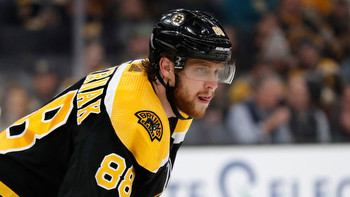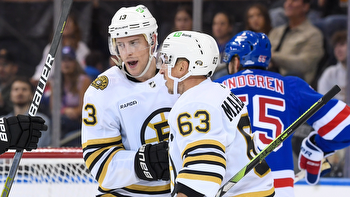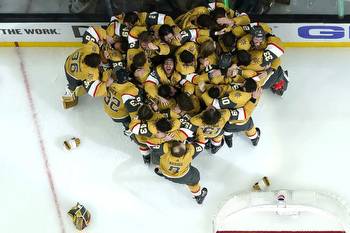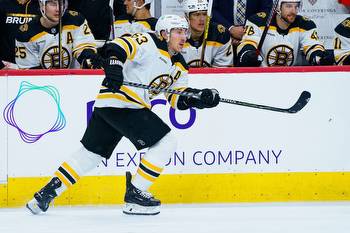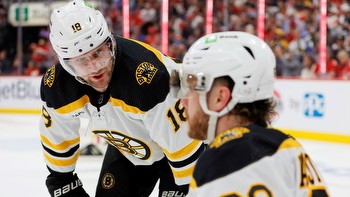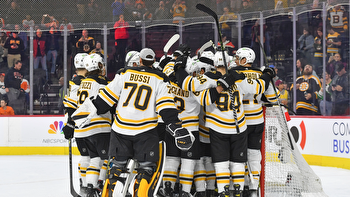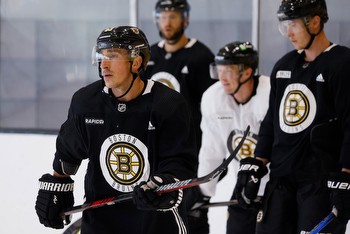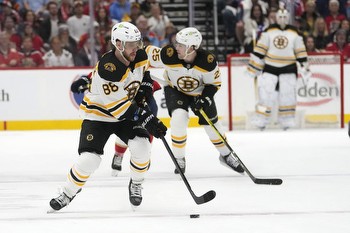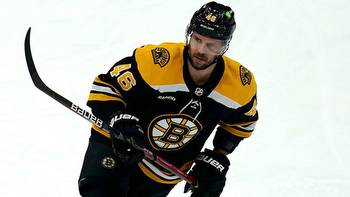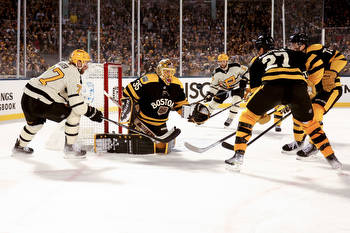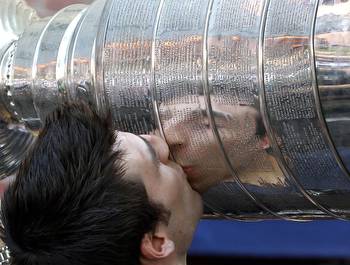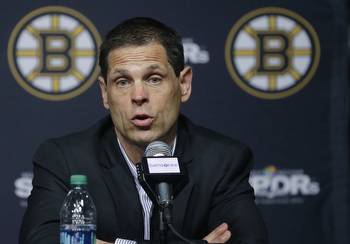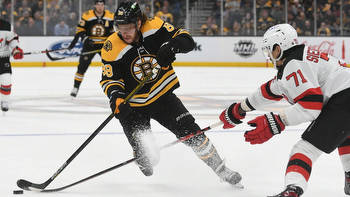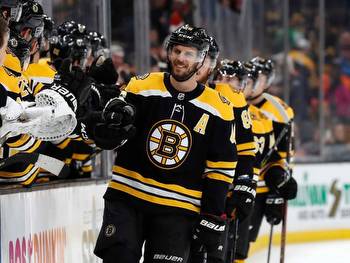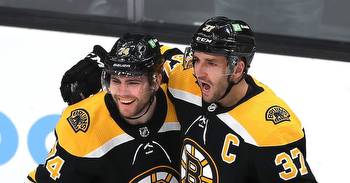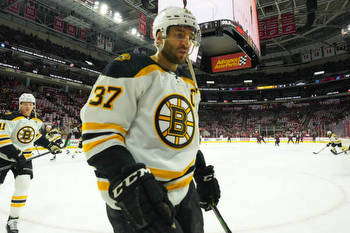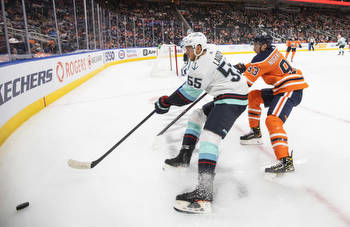How many numbers from this Bruins era will be retired?
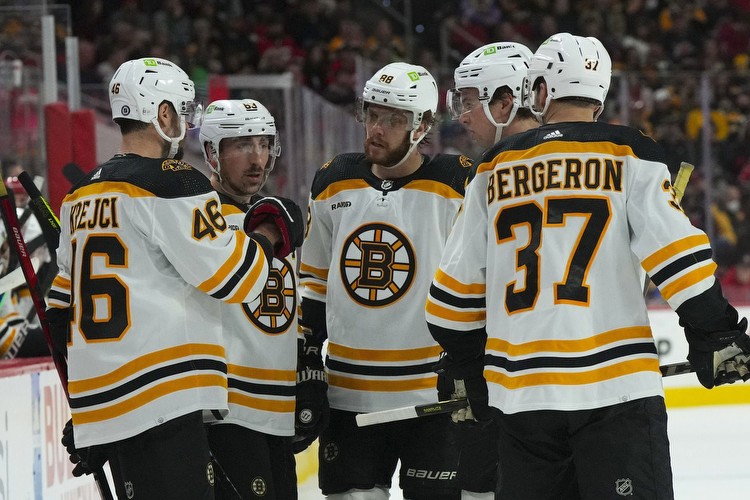
Should Krejci's number be retired?
In the span of three weeks, the Bruins have seen both Patrice Bergeron and David Krejci retire. As the organization prepares to celebrate five “Era Nights” during its upcoming centennial season, it feels like one of those eras just came to an end.
The reality is that there is rarely a truly clean break from one era to the next, and that is true here as well. Brad Marchand is still around, and he was certainly a key part of that Bergeron-Krejci-Zdeno Chara era as well. The next era may be built around David Pastrnak and Charlie McAvoy, but those two have already been stars and franchise pillars for several years.
That said, it’s not a coincidence that of the five eras the team will celebrate, as defined by the Bruins themselves, one ends with Bobby Orr’s departure in 1976 and another ends with Ray Bourque’s in 2000.
One of the most common responses we’ve seen to both Bergeron and Krejci’s retirements is one simple word: “Rafters.” We saw the same when Chara left the team in 2020. That, of course, refers to the TD Garden rafters, where there are currently 12 retired numbers hanging for the Bruins.
It raises an interesting question: How many numbers from this Bruins era will end up being retired? Let’s take a look at the candidates and predict whether they’ll end up in the rafters.
Zdeno Chara (33)
Everything changed when the Bruins signed Chara in July 2006 and named him team captain. On the ice, he and fellow free-agent signing Marc Savard gave the Bruins stars to build around six months after they had traded away Joe Thornton. In the room, Chara demanded a culture of hard work and accountability that remains in place 17 years later.
Chara served as Boston’s captain for 14 years, the second-longest captaincy in Bruins history behind only Bourque (15 years). He helped lead the Bruins to the franchise’s first Stanley Cup in 39 years in 2011, playing a team-high 27:39 per game in the playoffs. He won one Norris Trophy as the NHL’s best defenseman in 2009 and finished top five in voting five other times.
Chara ranks seventh in Bruins history in games played at 1,023. He is a lock to be a Hockey Hall of Famer in a few years, and while he did play 10 years with other teams, it is undoubtedly his 14 years in Boston that he will be best remembered for. On the Mount Rushmore of legendary Bruins defensemen, Chara can rightfully claim his place next to Orr, Bourque and Eddie Shore.
Prediction: Yes. Chara is a stone-cold lock to have his number retired.
Patrice Bergeron (37)
Bergeron made the Bruins’ opening-night roster just months after being drafted as an 18-year-old second-round pick in 2003, and went on to play 19 incredible seasons in Boston.
Only Bourque and Johnny Bucyk played more games as a Bruin than Bergeron’s 1,294, and those are the only two to put up more points than his 1,040. Bergeron’s 427 goals rank third in Bruins history behind only Bucyk and Phil Esposito.
Bergeron served as captain for the last three years and was Chara’s right-hand man and co-leader for 14 years before that. He put up 20 points in 23 games during the 2011 Cup run, including two goals in Game 7 of the Cup Final in Vancouver, and is tied with Krejci and Marchand for second in Bruins history in playoff scoring.
Oh yeah, Bergeron also won an NHL-record six Selke Trophies as the league’s best defensive forward, including in each of his final two seasons. He finished top three in voting in each of his final 12 seasons, an absurd feat that will probably never be matched. It is not a stretch at all to argue that Bergeron is the best defensive forward in NHL history.
Prediction: Yes. Bergeron is a stone-cold lock to have his number retired.
David Krejci (46)
Like Bergeron, Krejci spent his entire NHL career in Boston – 15 full seasons in his case, plus a six-game first taste in 2006-07 added in. At one time, he was the Bruins’ No. 1 center ahead of Bergeron, including during the 2010-11 Cup-winning season, before eventually settling in as the rock-solid No. 2 behind Bergeron later in their careers.
Krejci ranks fifth in Bruins history in games played (1,032), fifth in assists (555) and ninth in points (786). Known for consistently stepping up on the biggest stage, “Playoff Krech” led the NHL in postseason scoring in both 2011 and 2013 and is tied with Bergeron and Marchand for second in Bruins history in career playoff points. He actually had more points per game in the playoffs (0.80) than the regular season (0.76) for his career.
While he never made an All-Star team or won a major award or even finished top-10 in points in a season, you can certainly make the case for Krejci as one of the best playmakers of his era. His passing, patience and spatial awareness on the ice was consistently a joy to watch.
If you’re looking for comparisons, Terry O’Reilly’s 24 being retired helps Krejci’s case, because Krejci had a better career by virtually every metric, including winning a Cup. Wayne Cashman’s 12 not being retired could be an argument against Krejci, because those two had remarkably similar career numbers, finishing within five games and seven points of each other.
Prediction: Yes. Krejci isn’t quite the lock that Chara and Bergeron are, but his postseason heroics on top of the regular-season counting stats push his case over the top.
Brad Marchand (63)
Marchand quickly worked his way up from fourth-line pest to Bergeron running mate and postseason difference-maker in 2011, including scoring two goals in Game 7 of the Stanley Cup Final in Vancouver.
He remained on Bergeron’s left wing for the next 12 years, growing into one of the best forwards in the NHL during that time. Marchand averaged over a point per game in six straight seasons from 2016-22, including a career-high 100 points in 2018-19. He has finished top five in Hart Trophy voting for league MVP twice and top 10 two other times.
With likely at least a couple years still to go, Marchand already ranks eighth in Bruins history in games (947), sixth in goals (372), ninth in assists (490) and seventh in points (862). His 128 career playoff points tie him with Bergeron and Krejci for second in team history, and chasing down Bourque’s franchise record of 161 isn’t out of the question.
Marchand is the odds-on favorite to take over the captaincy from Bergeron, which would only further cement his place in Bruins history.
Prediction: Yes. Marchand has almost certainly already done enough to get 63 retired, with whatever’s still to come serving as the icing on the cake.
Tuukka Rask (40)
Rask is the Bruins’ franchise leader in games played by a goalie (564), wins (308), playoff games played (104) and playoff wins (57). He won the Vezina Trophy as the NHL’s best goalie in 2014 and finished top five in voting two other years.
All that certainly makes for a pretty convincing case, but there are also a couple things that could work against Rask. One is that he was never the starter on a Cup-winning team, serving as Tim Thomas’ backup during Boston’s lone Cup win of this era in 2011.
Rask’s playoff “failures” were and still are dramatically overblown by his most vocal critics. He ranks ninth all-time in postseason save percentage (.925) and was, on the whole, terrific during the Bruins’ 2013 and 2019 runs to the Stanley Cup Final. Still, the fact remains that he and the Bruins were not able to finish the job, and that could matter when we’re talking about retiring numbers.
The second thing that could hurt Rask is that the Bruins have never retired a goalie’s number. Tiny Thompson, Frank Brimsek and Gerry Cheevers are all in the Hall of Fame as Bruins, all of them won at least one Cup with the team, and none of them have their number hanging from the Garden rafters. Rask has the counting stats over all of them, but there’s no question that the organization’s bar for retiring goalie numbers seems to be much higher than it is for skaters.
Prediction: Yes… eventually. I could see Rask having to wait a while like O’Reilly (17 years after he retired) and Rick Middleton (30 years after he retired), with potentially all four of the guys above him here going up first. But I do think his 40 will get raised at some point.
Tim Thomas (30)
Thomas’ highs were unquestionably higher than Rask’s, and arguably higher than any goalie’s in all of Bruins history. He won two Vezinas in 2009 and 2011, leading the NHL in save percentage and goals-against advantage both times.
Of course, he also capped off that 2010-11 season with a Stanley Cup and Conn Smythe Trophy as playoff MVP. Thomas was otherworldly that spring, posting a .940 postseason save percentage that included a ridiculous .967 mark against the Canucks in the Final and a 37-save shutout in Game 7.
Thomas doesn’t have the same longevity or counting stats as Rask or even Thompson, Brimsek or Cheevers, though, ranking sixth in Bruins history in games (378) and fifth in wins (196).
Prediction: No. I would be a yes personally, but I think the Bruins’ high standard for goalies keeps 30 out of the rafters, even if Rask’s 40 eventually goes up. Maybe the standard changes at some point, or maybe the Bruins do something where 30 goes up for both Thomas and Cheevers, who also wore it during his best years.
David Pastrnak (88)
Charlie McAvoy (73)
We’re combining these two because they’re still in their primes and, barring a shocking trade or catastrophic injury, still have many years to go in Boston. They’re part of the Chara/Bergeron/Krejci era, but they’re also part of the next era. The 27-year-old Pastrnak’s new eight-year contract begins this season. McAvoy, 25, is locked in for seven more years.
Pastrnak already has a Rocket Richard Trophy and two top-five Hart finishes under his belt. This past season he became just the second Bruin ever to score 60 goals in a season, joining Esposito, who did it four times. He already ranks eighth in Bruins history in goals (301) and 11th in points (617). If he averages 31 goals a year over the course of his eight-year contract, he’ll surpass Bucyk’s franchise record of 545.
McAvoy has already finished top five in Norris voting twice and top 10 another year. He has played top-pairing minutes since debuting as a 19-year-old during the 2017 playoffs and took over as the clear No. 1 defenseman as Chara aged and eventually departed. If he continues to play shutdown defense while building his offensive game like he has over the last couple years, McAvoy should be next in that long line of legendary, franchise Bruins defensemen.
Obviously, both Pastrnak and McAvoy’s legacies would benefit from winning at least one Cup, something they came one game away from in 2019. They’re the new cornerstones, they’re both already wearing the alternate captain’s ‘A,’ and one of them will someday wear the captain’s ‘C’ – if not now, then after Marchand.
Prediction: We’ll revisit this later. Pastrnak and McAvoy seem to be on their way, but let’s let them actually play the rest of their careers before we raise their numbers to the rafters.

